#ways of knowing
Text

By: Stephen Knight
Published: Feb 20, 2024
There was a time when you could count on the left to defend science with the sort of zeal that would make a religious fundamentalist blush. Scientific knowledge was once gleefully wielded to expose and mock the magical thinking of creationists, anti-vaxxers, Flat Earthers, astrologers and homoeopaths. However, this staunch commitment to scientific empiricism has recently begun to waver. It is now increasingly coming into conflict with the new tenets of the ‘diversity, equity and inclusion’ (DEI) agenda.
You can see this clearly in the Biden administration’s proposed new guidelines for the US Department of Health and Human Services (HSS). As the Washington Free Beacon reports, staff working in public-health agencies like the Food and Drug Administration (FDA) and the Centers for Disease Control (CDA), which are overseen by the HSS, could soon be instructed to consider ‘multiple forms of evidence, such as indigenous knowledge’ when going about their duties.
Put simply, advocates of ‘indigenous knowledge’ argue that various cultures throughout history have their own ways of understanding the world. And these alternative, indigenous ‘ways of knowing’, they say, should be utilised alongside more established scientific methods in research and in policymaking.
Yes, some DEI advocates really do think that public-health bodies should seek the input of tribal elders and spiritual leaders – alongside, say, qualified physicians and epidemiologists. What’s more, they believe that racism is the only reason it has taken so long for indigenous knowledge to be utilised in this way. They argue that science is a ‘Western, colonialist structure’ that has only come to dominate our thinking thanks to white supremacy. This nefarious falsehood began in academia, with calls from activists to ‘decolonise’ science. Now it has reached the highest levels of the US government.
The Biden administration is not even the first Western government to sacrifice science to the DEI agenda. Last year, the government of New Zealand decided that science classes in schools should teach that Maori ‘ways of knowing’ have equal standing to ‘Western science’. Scientists who objected to this found themselves under investigation by the Royal Society of New Zealand. Three of them, including one of Maori descent, resigned from the society in protest.
The claim that science is ‘Western’ is absurd, of course. One of the many wonderful things about science is that it does not discriminate. Science is a universal, cross-cultural concept. It invites anyone and everyone to participate and contribute to our growing understanding of reality. Science does not care about what you look like or where you come from. All science cares about is whether your methods and conclusions are sound enough to survive scrutiny. This clearly cannot be said for indigenous knowledge.
This is why there aren’t any ‘indigenous’ ways of flying an airplane that supersede our scientific understanding of aerodynamics. Or why the NHS doesn’t offer exorcisms as part of its mental-health services. A blood test administered in a clinical setting will yield the same results whether it’s carried out in London or Nairobi – because science actually works anywhere you do it. It’s about the ‘how’, not the ‘who’.
If every single piece of scientific knowledge were erased tomorrow and we had to start all over again, we would eventually come to the same conclusions as we have today. This is not true of indigenous knowledge, because, unlike science, it is not underpinned by logic and reason.
We all know that treating indigenous knowledge as akin to scientific evidence is a bit silly. But I suspect that is probably the point. Like with trans-rights ideologues, today’s self-professed ‘anti-racists’ like to frame statements of the obvious as akin to acts of bigotry. It gives them enormous power over the rest of us. We are all essentially being dared to say that relying on indigenous knowledge is a terrible idea. Of course, if you do say this in the wrong circles, you will be accused of racism and you will be silenced.
With modern-day anti-racism, the goal is not to address actual inequalities or to improve the material wellbeing of oppressed minorities. The real aim is to tear down anything that is perceived to be ‘white’ or ‘Western’. And the fact that science is now being placed in the firing line, thanks to racial identity politics, should worry us all.
The suggestion that the gold standard of science is a uniquely white or Western standard is as ludicrous as it is racist. It perpetuates the deeply prejudiced idea that non-Western or non-white groups cannot grasp the basics of science, and therefore it would be unfair to expect them to. This is tantamount to claiming there is an innate quality possessed by white Westerners that makes them uniquely suited to the study and advancement of science. This notion would not seem out of place at a KKK rally, yet it is a depressingly common view among so-called anti-racists. This is the bigotry of low expectations.
The push by the White House to incorporate indigenous knowledge into public-health policy is unbelievably reckless. It arrives in a post-pandemic context when public trust in our scientific institutions is already at an all-time low. Surely, that trust will now only fall further. After all, how can we possibly trust that those tasked with looking after our health are doing so effectively, when their objectivity has been so clearly compromised?
Science often gets things wrong, of course. But unlike indigenous ways of knowing, science rewards you for catching errors. It incentivises the pursuit of truth over accepting received wisdom. There are no religious commandments or cultural dogmas dictating the scope of scientific investigation. Science simply finds out ‘what is’ – and to hell with any sacred cows that are slaughtered along the way.
Standards of objectivity are essential when it comes to science and public health. We should make no apologies for defending them from the encroachment of pseudoscience, whatever form it comes in.
Stephen Knight is host of the Godless Spellchecker podcast and the Knight Tube. Follow him on Twitter: @GSpellchecker
#Stephen Knight#ways of knowing#indigenous ways of knowing#science#indigenous knowledge#objectivity#reason#evidence#pseudoscience#antiracism#antiracism as religion#neoracism#religion is a mental illness
7 notes
·
View notes
Text
#Navy Blue#Zeroh#Life's Terms#Ways Of Knowing#Music#Hip Hop#Conscious Hip Hop#East Coast Hip Hop#Jazz Rap#Drumless#Neo-Soul#Chipmunk Soul
37 notes
·
View notes
Audio
Navy Blue - Life's Terms (ft. Zeroh
26 notes
·
View notes
Link
Navy Blue is back (and so am I!)...Ways of Knowing, available now.
9 notes
·
View notes
Text
8 notes
·
View notes
Text
In the new study — the largest and the first genome-wide analysis to tackle the Polynesian-Native American mystery — researchers looked at 807 Indigenous individuals from 17 populations spanning the Pacific Islands (which included Polynesian islands and Vanuatu, in Melanesia) and 15 Native American groups from the Pacific Coast of South America. Their results showed "conclusive evidence for prehistoric contact of Polynesian individuals with Native American individuals (around A.D. 1200) contemporaneous with the settlement of remote Oceania" (a region that includes Polynesia), the researchers wrote in the study.
Laura Geggel in LiveScience. Polynesians and Native Americans paired up 800 years ago, DNA reveals
I just found out about this study today. I enjoyed the article so much because when I was a boy--probably in 6th grade--my imagination was fired by the book Kon-Tiki. I don't think I read the book well, I am not the best reader, and haven't studied the subject since then. Nevertheless over the years I have gleaned a little knowledge of the navigation skills of people who were assumed not to have any. This article in The Smithsonian, How the Voyage of the Kon-Tiki Misled the World About Navigating the Pacific is a good introduction to that. The open questions this study leaves make it all the more delicious to me.
5 notes
·
View notes
Text
Ways of Knowing, Navy Blue (2023)
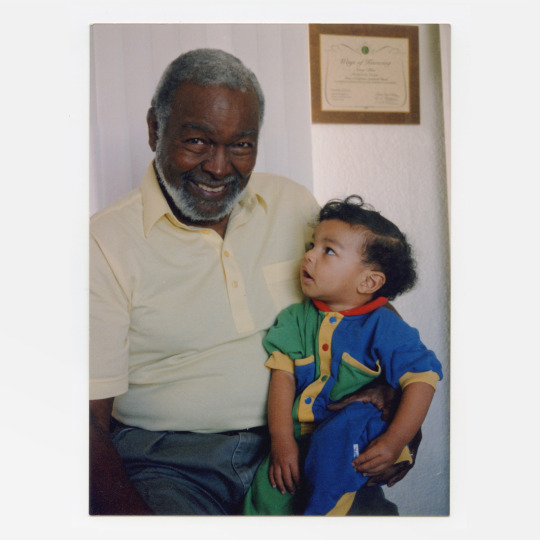
If Navy Blue may previously have erred towards a sort of hip-hop that, while obviously skilled in its manufacture and tasteful in its palette, was also a little overly vibe-heavy and lacking in substance, a little prone to platitude and vulnerable to self-help-isms, Ways of Knowing declares far, far more profoundness to his art. Retaining his sumptuous palette and overall project cohesion, this is a much more intimate and substantial work, a major label debut that polishes and bolsters his sound without losing anything of the artistic essence crafted over Navy Blue’s past several releases.
Pick: ‘Pillars’
#navy blue#ways of knowing#rap#hip-hop#jazz rap#conscious hip-hop#east coast hip-hop#2023#music#review#music review
2 notes
·
View notes
Text
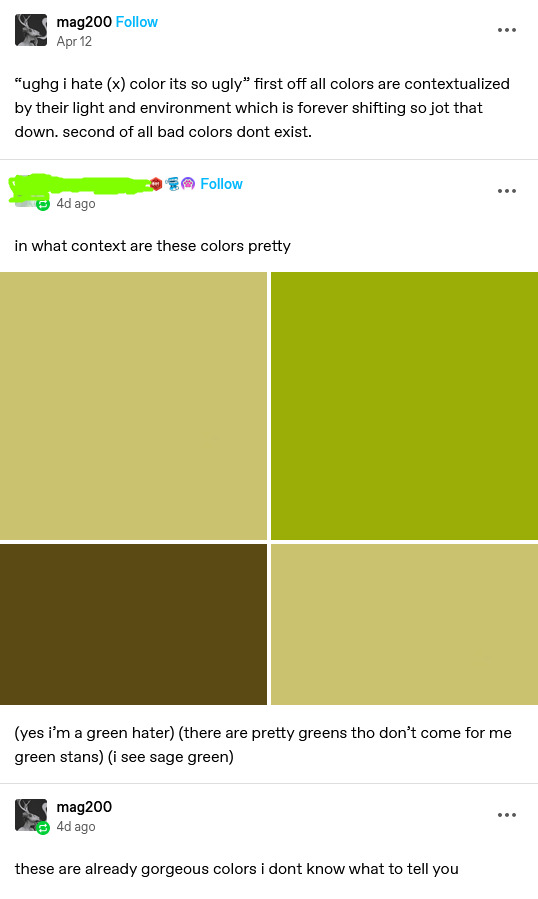
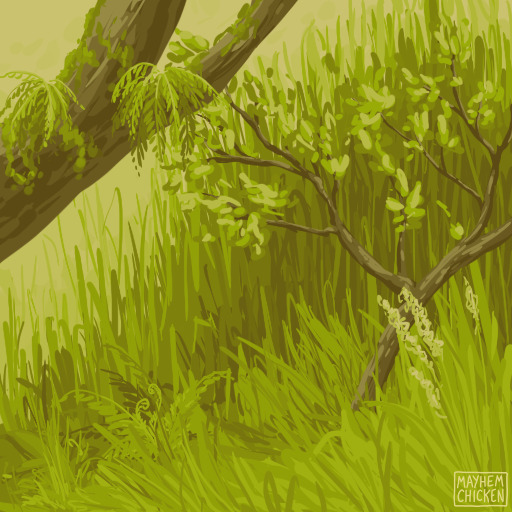
in the hour or so it took me to draw this op turned reblogs off
EDIT: reblogs are STAYING OFF. op was right and correct and i have never regretted making a post as much as this one. if you want to reblog my art you can reblog something else from my blog. or commission me, lord knows i deserve financial compensation for the nightmare this post has put me through
#art#i had to block multiple people because of this post and i easily could have blocked more#do you guys have any idea how exhausting it is to hear 400 people make the exact same unfunny joke each thinking they're being original#or worry that another person might get harassed over a post i made because of the way people are talking about them#or be harassed/insulted YOURSELF because some people don't know how to fucking behave#you guys don't get reblogs back. you should be grateful i'm leaving the post up at all.
65K notes
·
View notes
Text
the funniest meltdown ive ever had was in college when i got so overstimulated that i could Not speak, including over text. one of my friends was trying to talk me through it but i was solely using emojis because they were easier than trying to come up with words so he started using primarily emojis as well just to make things feel balanced. this was not the Most effective strategy... until. he tried to ask me "you okay?" but the way he chose to do that was by sending "👉🏼👌🏼❓" and i was so shocked by suddenly being asked if i was dtf that i was like WHAT???? WHAT DID YOU JUST SAY TO ME?????????? and thus was verbal again
#yeehaw#1k#5k#10k#posts that got cursed. blasted. im making these tag updates after... 19 hours?#also i have been told it should say speech loss bc nonverbal specifically refers to the permanent state. did not know that!#unfortunately i fear it is so far past containment that even if i edited it now it would do very little. but noted for future reference#edit 2: nvm enough ppl have come to rb it from me directly that i changed the wording a bit. hopefully this makes sense#also. in case anyone is curious. though i doubt anyone who is commenting these things will check the original tags#1) my friend did not do this on purpose in any way. it was not intended to distract me or to hit on me. im a lesbian hes a gay man. cmon now#he felt very bad about it afterwards. i thought it was hilarious but it was very embarrassed and apologetic#2) “why didn't he use 🫵🏼?” didn't exist yet. “why didn't he use 🆗?” dunno! we'd been using a lot of hand emojis. 👌🏼 is an ok sign#like it makes sense. it was just a silly mixup. also No i did not invent 👉🏼👌🏼 as a gesture meaning sex. do you live under a rock#3) nonspeaking episodes are a recurring thing in my life and have been since i was born. this is not a quirky one-time thing#it is a pervasive issue that is very frustrating to both myself and the people i am trying to communicate with. in which trying to speak is#extremely distressing and causes very genuine anguish. this post is not me making light of it it's just a funny thing that happened once#it's no different than if i post about a funny thing that happened in conjunction w a physical disability. it's just me talking abt my life#i don't mind character tags tho. those can be entertaining. i don't know what any of you are talking about#Except the ppl who have said this is pego/ryu or wang/xian. those people i understand and respect#if you use it as a writing prompt that's fine but send it to me. i want to see it#aaaand i think that's it. everyday im tempted to turn off rbs on it. it hasn't even been a week
145K notes
·
View notes
Text
#i don't believe that people for serious reasons sort their books any way but by author#and then obviously by release date/series within that#i am being told that i am being JUDGY#also if you sort your books any other way HOW DO YOU FIND THEM#i really need to know#polls#can't believe i forgot to include genre in here
42K notes
·
View notes
Text
By: Richard Dawkins
Published: Jun 3, 2023
“We must trust to nothing but facts: these are presented to us by nature and cannot deceive. We ought, in every instance, to submit our reasoning to the test of experiment, and never to search for truth but by the natural road of experiment and observation”
(Antoine Lavoisier, 1743-94).
“Nothing is too wonderful to be true, if it be consistent with the laws of nature”
(Michael Faraday, 1791-1867).
Evidence-based medicine was defined in an influential paper in the British Medical Journal 1996 as “The conscientious, explicit, and judicious use of current best evidence in making decisions about the care of individual patients.” It seems surprising that it even needed defining. How could sensible medicine not be evidence-based? The authors consider, and reject, the mutually contradictory arguments that, on the one hand, “All doctors do it anyway” and, on the other hand “It’s a dangerous innovation perpetrated to suppress the freedom of doctors to exercise their clinical judgement.” I want to generalise the arguments and advocate what I am calling Evidence-based Life.
Every moment of our lives we are faced with decisions. What shall I do next? What do I believe? To help us decide what to do next, we can draw upon copious evidence: the evidence of our senses, evidence from books, from conversations, newspapers, the Internet. We have the evidence from past experience (What happened when I previously was in this situation and did so-and-so?). We have evidence from a kind of future, as we simulate possible futures in imagination (I can see myself doing so-and-so and I can imagine the consequences). We can take advice from friends or mentors, books or traditional wisdom – and that can be seen as vicarious borrowing of other people’s past experience and simulated futures.
Much the same can be said of what we believe. I believe the world is round because I’ve flown to Australia via Asia and returned via America. I believe it because I’ve seen photographs from space. I believe it because of books I’ve read, lessons at school from teachers who seemed to know what they were talking about, and so on. I believe it because physics books tell me of a principle whereby large bodies tend to become spherical under the influence of gravity. A very great deal of what we know, even that which really is based on sound scientific evidence, we have to take on trust, because we haven’t the time or the ability to examine it in detail.
Even expert scientists haven’t the time or the expertise to evaluate sciences other than their own. Most biologists are ill-equipped to understand modern physics. And vice versa although, I have to admit, to a lesser extent. In any case, nobody has the time to do full justice to all the detailed research papers in a journal such as Nature or Science, even if we could understand them. If we read a report that gravitational waves have been reliably detected as emanating from a collision between two distant galaxies, most of us take it on trust. It almost sounds like taking it on faith. But it’s a faith that’s more securely grounded than, say, religious faith. That’s an understatement. When biologists like me express “faith” in the findings of physics, we know that physicists’ predictions have been verified by experimental measurements to find accuracy. Very different from “faith” in, for example, the doctrine of transubstantiation which makes no predictions at all, let alone testable and tested ones.
Nevertheless, scientific evidence is not always reliable. With the best will in the world, scientists can deceive themselves. Medical science has adopted the Double Blind Control Experiment, an admirable device for eliminating all possibility of subjective bias. Long ago, my then wife Marian (now a Fellow of the Royal Society) and I used it for fun in a trivial demonstration experiment. We wanted to know who made the best razor blades for shaving, Gillette or Wilkinson. Our quality criterion was how long a blade would last before I found it uncomfortable to shave and discarded it. Obviously that was a subjective judgement. It was important that I should not be allowed to know which make of blade I was using to shave. So Marian was solely responsible for putting a new blade into my razor, every time I pronounced the previous one worn out. If she had alternated the blades, Gillette, Wilkinson, Gillette, Wilkinson etc, that could have given me a clue. So she chose the blades according to a previously written-down random sequence, which I was not allowed to see. After a previously written-down number of blade-changes (I can’t remember what that number was but it had to be pre-determined), we looked at the data, consisting of a series of durations measured in days before each blade wore out. We analysed the data statistically and concluded that Wilkinson blades were significantly superior.
This was technically a Single-blind experiment. There remained the possibility that Marian could have inadvertently influenced my decision on when to declare a blade exhausted – the so-called Clever Hans Effect. A German horse called Clever Hans was apparently able to do simple arithmetic, tapping his hoof five times, say, when asked “What is two plus three?” It was eventually revealed that his trainer was unconsciously giving him cues, subtly changing his body language when Hans’s hoof taps reached the right number. Ideally our experiment should have been not Single Blind but Double Blind: the person inserting the blades into the razor should have been ignorant as to which was which – a little harder to arrange, though not impossible. Somebody else, neither Marian nor I, would have prepared a randomised sequence of blades, then Marian should have dispensed them when I pronounced the previous one spent. Clinical trials of new medicines nowadays usually follow the Double Blind design: the patients, the doctors or nurses administering the doses, and the experimenters judging the medicine’s effectiveness, and are kept in strict ignorance as to which patients get the drug, which they control. Without the strictures of the Double Blind design, there is always the danger of subjective judgement creeping in.
Blind control trials constitute only one weapon in science’s armoury against being misled by subjective judgement. Experiments are repeated. Scientific papers are rigorously refereed before publication and exposed to critical scrutiny afterwards. Experiment itself is the only ultimate safeguard against the notorious “correlation doesn’t have to imply causation” truism. Correlation really does imply causation if the putative cause happens when an experimenter makes it happen, rather than waiting for it to happen spontaneously. Of course, the experimenter must make it happen on a large number of independent occasions, and at random rather than in a regular pattern such as might introduce a spurious correlation. Finally, the correlation must be unlikely to have arisen by chance – unlikely according to some agreed criterion such as, “If we repeated the whole experiment a thousand times, we’d expect only one of those repeats to yield a result as extreme as this by chance.” That’s what tests of statistical significance are for.
In advocating evidence-based life, I don’t of course mean we should do double-blind, statistically-analysed experiments before making a decision, or before believing anything. Life’s too short, and there are many other reasons why it would be impractical. But it is worth imbibing the spirit of evidence-based medicine by being deliberately aware of possible sources of bias. Have I looked even-handedly at the available evidence or did I under-value or even ignore evidence that contradicted my prior beliefs? Or evidence that might have contradicted the beliefs of my tribe (religion, political party, favourite opinion-leader etc)? Do I read only the Guardian and ignore the Telegraph? Or vice versa. Do I watch only Fox News and ignore CNN? Do I tune out when exposed to news, or views, that contradict my prior prejudices? Are my views on climate change (vaccination, Covid-protection masks) based on the best available evidence, or are they coloured by political or religious prejudice, or tribal loyalties of some kind?
Evidence-based Life could justify a whole book, not just a brief essay such as this. So let me just mention some of the more insidious and alluring alternatives which might tempt us away from evidence. I’ll list them in the form of headings to which I might return in future postings.
It’s how I feel. It may not be true for you but it’s true for me.
Alternative “ways of knowing” are just as valid as science, which is just the mythology of a white male tribe.
I don’t need science, I’ve got my Holy Book.
I don’t need science, commonsense is good enough for me.
The evidence of my biology clearly indicates that I am male, but I feel I am a woman therefore I am a woman.
Richard Dawkins
==
Richard Dawkins' new Substack is "The Poetry of Reality with Richard Dawkins."
#Richard Dawkins#evidence#evidence based life#evidence based medicine#subjective reality#objective truth#my truth#lived experience#ways of knowing#other ways of knowing#science#true for me#i feel it in my heart#faith#faith is not a virtue#religion is a mental illness
21 notes
·
View notes
Text

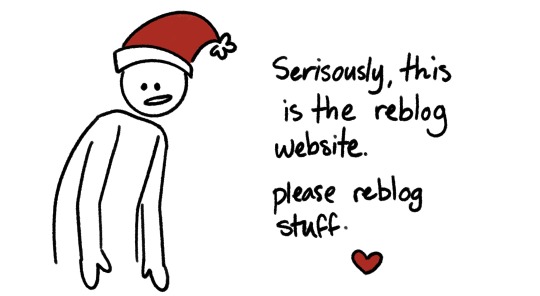
heeppy hoolida
#listen#likes are appreciated but here on tumblr the best way to show the creators you love that you care is by reblogging their stuff#sharing is caring#i know that i always appreciate when i see art reblogged from the people i follow that i wouldn't have come across on my own#<3<3<3#EDIT: added alt text to the images
53K notes
·
View notes
Text

"I want to eat you" is their love language and you can't change my mind
#hazbin hotel#hazbin hotel fanart#hazbin alastor#hazbin rosie#radiorose#alastor#my art#autodesk sketchbook#they are so freaky they must have so many fucked up conversations like that I just know it#it's their weird way of “flirting” yk what I mean#I headcanon that Alastor HATES burgers and fast food in general ik it's very specific#my artstyle is so inconsistent ahah I'm experimenting don't mind me
29K notes
·
View notes
Text
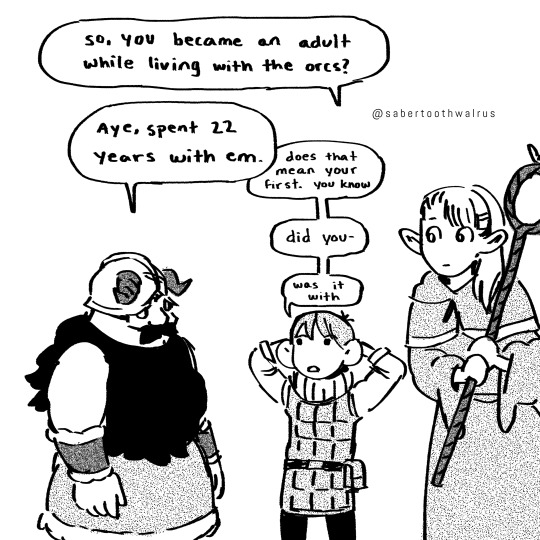
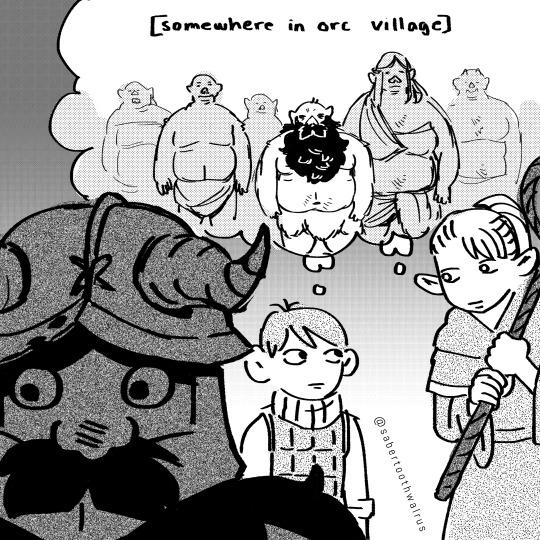
don't ask him about that it's private
#for the record if senshi actually did have an illegitimate child he wouldnt know about it#no WAY he’d be a deadbeat on purpose#dungeon meshi#delicious in dungeon#senshi of izganda#marcille donato#chilchuck tims#my art#comic
27K notes
·
View notes
Text
i didn't have "i'm broken" teenage asexual angst i had "i'm literally being the only reasonable one about this concept and the rest of you are behaving like fucking freaks" perception issues
#oh the experience of being 13 years old and seeing all my friends talking about wanting to have sex and obsessing over it#and being like 'we are all literally WAY too young to be having sex what the actual fuck are you talking about#why are you even considering it when we have much more important things to worry about. like how much middle school sucks'#you know what though. i still stand by this. that was an entirely reasonable thought to have and i WAS being normal about it#anyway#mine#asexuality
65K notes
·
View notes
Video
youtube
Ornette Coleman: Intro To Harmolodics
Song X Records
Ornette Coleman: An Introduction to Harmolodics
In 1995 Ornette Coleman released Tone Dialing with his band Prime Time. It was the first album on his new worldwide label Harmolodic with Polygram. Ornette is always asked, “what is Harmolodics?” Harmolodics is the term he coined to describe his music and his philosophy of life. He decided to do a short film about Harmolodics. A few artists were in enlisted, including Lou Reed, Thurston Moore, Yoko Ono and dancer Wunmi Olaiya. The film only went out to journalists as part of the Tone Dialing press kit. This is the first time it is being released publicly in honor of the occasion of Ornette’s 90th birthday March 9, 2020.
18 notes
·
View notes